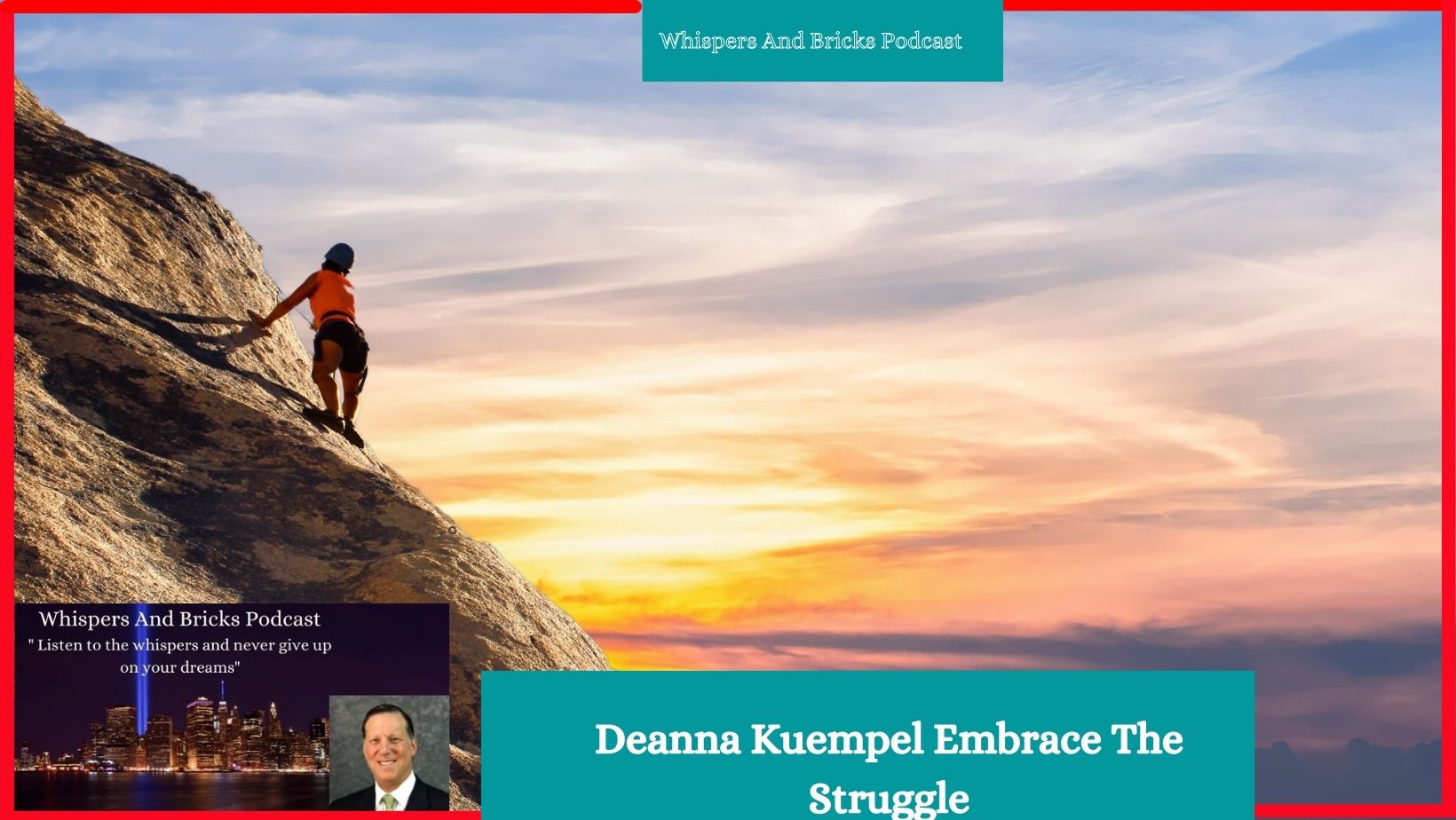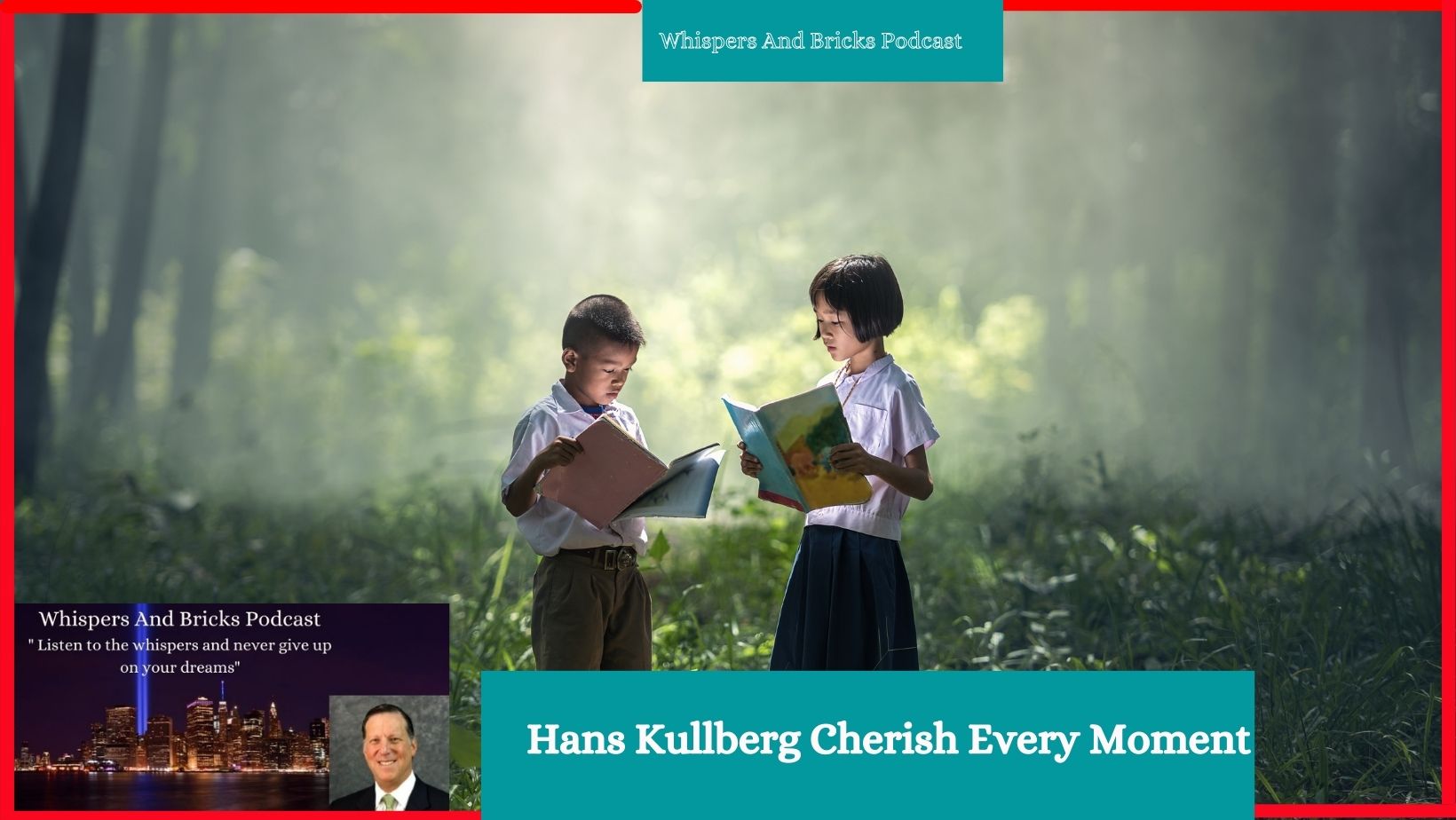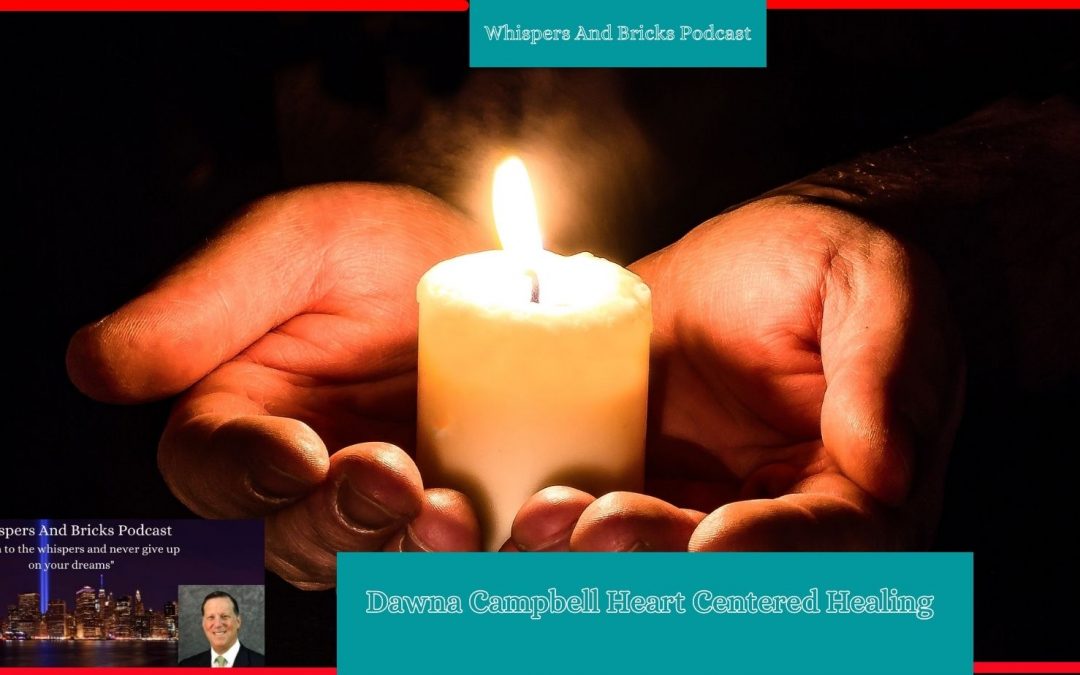
89. Carmen Davailus A Story That Needed To Be Told
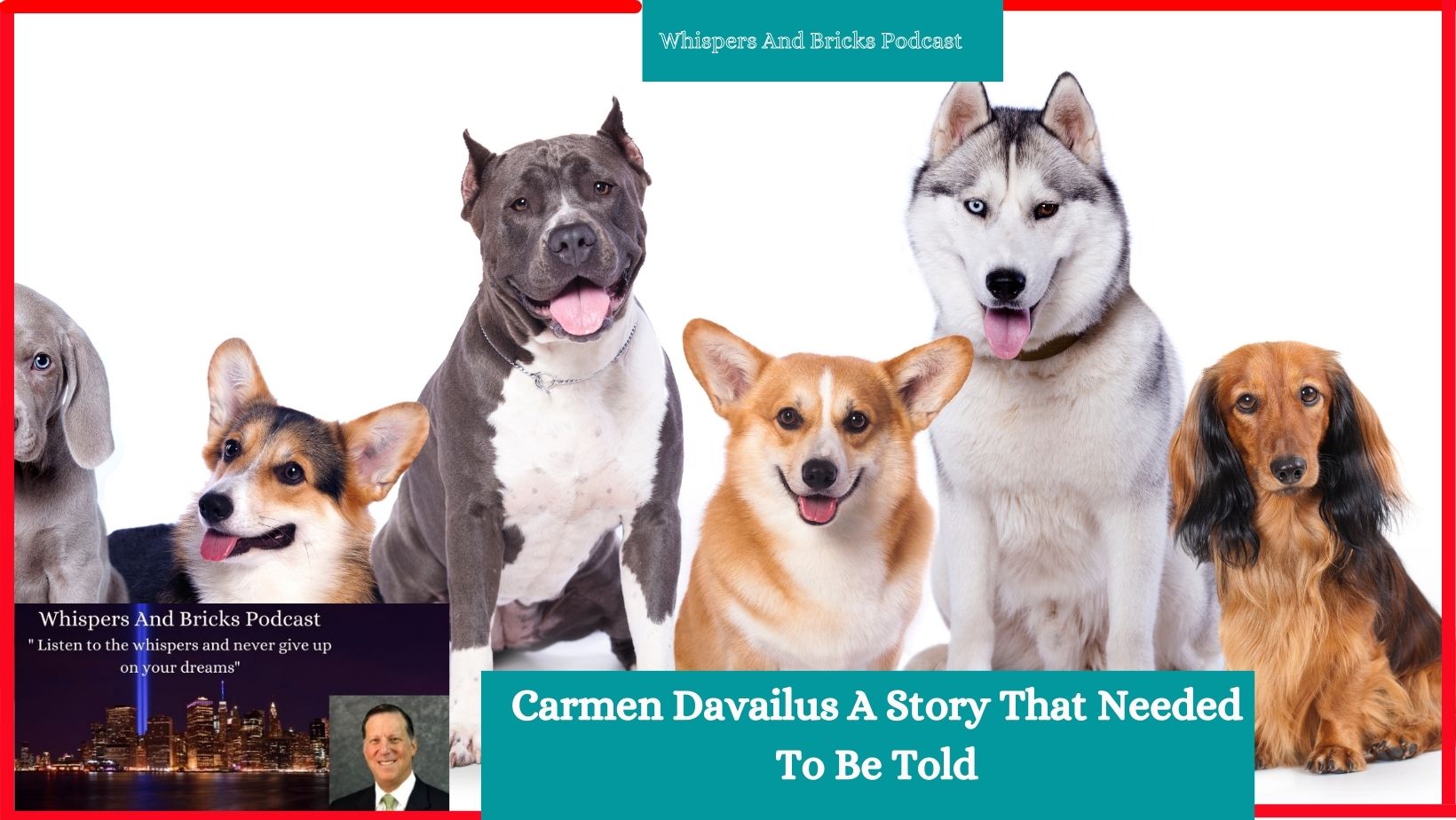
Carmen Davailus A Story That Needed To Be Told
Carmen Davailus A Story That Needed To Be Told



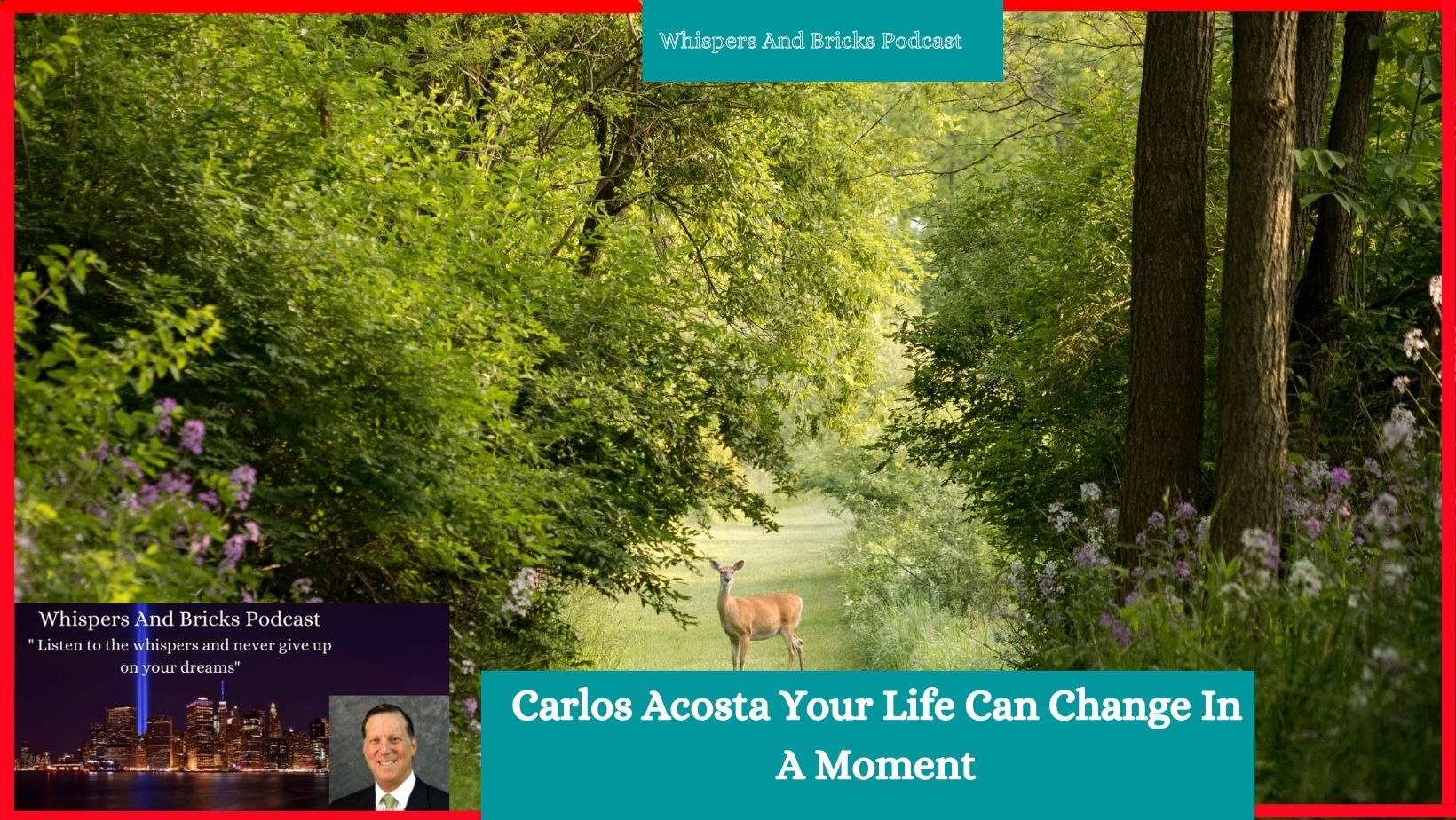
Summary:
Carlos Acosta is a father, husband, and successful business owner but life wasn’t always perfect for him. He has overcome many bricks including a divorce and a car crash that almost left him dead. He healed from his injuries with the help of his family. From that moment on his life changed he no longer takes one moment for granted. He knows that your life can change in an instant. He hosts a podcast focused on seizing the day. He reminds us to take nothing in life for granted.
Show notes:
https://www.facebook.com/carlosacosta661011
https://podcasts.apple.com/mx/podcast/one-day-less/id1483798559?l=en&i=1000453742074
https://www.linkedin.com/in/carlos-acosta-rodr%C3%ADguez-02970527/
carlostrc@yahoo.com
Episode Transcription
Intro Plays
Ari: Welcome to whisper secrets. My name is Ari shoberg and I’m your host. My guest today is Carlos Acosta, or Carlos Acosta Rodriguez. He’s been an apple Consultant since 1990. He is also the creator of the podcast one day less, and the FM show sublime. He is also an audiobook producer and radio broadcaster. Carlos is passionate about his work loving everyday is experienced personally and professionally. He cares about his clients giving them the best advice so they can perform better every time with Apple’s technology. One day less is about really giving the famous words Carpe Diem, a practical meaning in your life. The Sublime show on FM radio is a good vibes time, through special messages of beautiful music from the 80s and beyond. As Carlos puts it, impulse and inspiration come from different sources. I am a car accident survivor. God left me here for a mission a new purpose. Life is a gift. Enjoy it. Please help me welcome Carlos Acosta. Carlos, how are you my friends?
Carlos: already? I’m glad to be here. And other. Thank you. For my
Ari: pleasure. My pleasure. Now, you were you were born in 1966. In Mexico, correct?
Carlos: Yes, yes. I’m Mexican. Oh,
Ari: very good. Now growing up. I understand you’re an avid tennis player, since like the age of 10. Can you tell us a little bit about that? What was you know, how did that happen? What was going on?
Carlos: Well, you know, my father loves sports, a sport available for him. So he introduced us via my my siblings to play tennis at a young age. And it’s been a pleasure for me playing that sport since then. Because it’s very competitive. You know, it’s very health healthy for the mind, you know, to, to learn winning and learn losing. It’s been a great experience for me playing tennis. Having my cramps, my friends, I’m sorry. I might, I might if it’s so.
Ari: Wow. You know, and it’s interesting, because tennis is one of those rare sports, that it’s all you. I mean, you know, there’s nobody else there’s no, you know, it’s not like a team sport, so to speak basketball, you know, there are four of the guys on the court with you. So if you’re slumping a little bit, they can pick it up. In tennis. If you’re slumping, it’s all you right.
Carlos: You know, it’s that’s the beauty and what I love tennis, because you need to finish you need to cross the line, and nobody else to stop to do in the middle of the game. You need to finish. You have to face your demons in the middle of the match. Go on. And that’s wonderful. Because that’s the that’s real life. Right? Nobody can change plays with us in general. I believe that’s something that we need to do. Right work life. So tennis is that that’s the beauty of the sport.
Ari: Wow, that’s great. Now, you are a father of two you have a son and a daughter. Right? Both are in their 20s. Now, you also mentioned that you were divorced and then remarried. So let’s start with worthy any of the two children was your first wife?
Carlos: Yes, yes. From for my first wife. It’s actually
Ari: both kids. Both kids. Yeah. Okay. And like, what happened? How long? How long were you married? Before you divorce?
Carlos: About 1314 years? And then well, it was time to pathways. Because because, you know, here in Mexico, the tradition says that you marry forever. I came in that extract type of life. And it was very difficult morally, you know, consciously because you need to Pathways against society in a way right? Right is not ready for you to say I’m going to divorce. So being divorced very hard as itself. Then you have to face society and friends and family. So it’s hard. I live to tell that. So, of course you need to go.
Ari: Right. And you went on and then you met another woman, I guess, right? Yes. And you got happily married? A wonderful
Carlos: lady. Yes. We’re very happy fangirl, and we’re thriving in life. And it’s been now almost eight years together. Oh, wow. Okay. And that’s, that’s good. Because, you know, there’s, there’s like an after life after the divorce and after life. And sometimes I say, No more marriages. For me. It was more for me to marry again and to be happy again.
Ari: That’s wonderful. Now, you started a business as a computer systems engineer in 1990. And I gotta be honest, you know, the name of the broadcast, the name of this podcast is whispers and bricks. And the whispers are, you know, the the whispers represent the good things in life, you know, God whispering to our minds and whispering to our hearts and telling us what the right thing to do is. And the bricks represent the bad things that happen to us. You know, if we’re not doing the right thing, then God throws a brick at us. It’s very simple. Now, everybody in the world, I don’t care who you are, what you are, has had a brick thrown at them at some point in time, some kind of a brick, some had more bricks, some had less bricks, but everybody goes through stuff. Now, looking at your, at your backgrounds. All right. Yeah, it’s true. You did get divorced. But then you remarried. You have two wonderful children. You’re you have a business. Things were looking really, really good. And everything was going hunky dory. And it was like Carlos, man, you got the world at your feet. You know, you’ve you’ve really got it made. And then you get hit with a major break. And I’m talking about the car accident. Tell us about the car accident.
Carlos: Well, it’s you know, it’s something that you always say, maybe you and me can say that will never happen to us. You know, this life is good. Everything is going great. It should be that way, every day of your life. And then I had a car accident. I woke woke up 10 years later asking what happened to me. I am here in the hospital.
Ari: How long? 10 days or 10 days? Yes. Okay.
Carlos: Yes. 10 days, in coma, in ICU. fighting for my life, doctors fighting for me. And family. They’re wonderful brothers who helped me when I was, you know, almost dying. And then, as I was telling you, I woke up asking what happened to me? I didn’t remember the accident to date. I don’t remember the accident. Or something. I don’t know what was in there.
Ari: So that was that was in that was January 3 of 2008. Correct? Correct. Now, you don’t remember anything. But were you were you driving? Were you? The passenger? What was what was the story there?
Carlos: Yes, it was the passenger. The driver fell asleep on the road. And then we crash into something maybe a rock maybe a wall? I don’t know. Thank God, not other carrier. Other persons. It was an I think from the road. And then they told me that happened. The driver told me that apologize to me about the accident. But you know, when you’re the co pilot, the copilot is the the chief of death. In Mexico, we always tell that when you’re besides a driver, that’s the most dangerous seat to be. Because that’s when you receive the most injuries when you you know, again, that happened, a big break in my life, something that I never imagined that could happen. And when I asked what I was doing in a hospital and told me you had a crash car accident, I didn’t believe that, you know, I pinched myself in there because I believe it was a minor. Wow. No, but nothing happens after I pinch myself. I say well, this is real. It was an accident. And you know, it was very hard for me to understand. Because you always think that only good things happen to you in your life. And so far, so good for me that year. 2008. But then reality struck me and it was very hard for me to understand that. You know, the question is what why me? Why me because I think everyone does have this right? but when it happens to you, you ask yourself, and you ask Kevin and just go and just people why me?
Ari: Why me? Right? So you had you had like, I mean, this was major, you you, as you said, you almost died, you had internal bleeding, you lost a lot of blood. I think, as from our previous discussion, you told me they had to take out your spleen. And then, I mean, it was just like, you know, you caught pneumonia, you had blood in your lungs. I mean, this was just this was not this was major major. So how long? How long were you laid up?
Carlos: Well, I was in the hospital for one month, and then three months in a wheelchair, recovering. Also, it struck me economically, I had to pay the medical bills. So it was, you know, like, six months that I was out of the normal, my normal life, fighting for physically, mentally, emotionally, you know, a big fight all those months, because you are not prepared for that you’re prepared to leave normally, like, we all do, when nothing happens in your life. And then this, and it was for me. And obviously, you know, before and after, in my life, and you do question about Locke, and life, what about, and you know, a lot of people have an opinion about what happened to you. And you will know which one to, to be the real one, to believe, right? And you have to, you have to wait for yourself, there’s no other way you have to do it for yourself, to know the truth by yourself internally, in your heart in your mind and to and to make conclusions about this episode in life?
Ari: So, let me ask you this, like here in America, you know, we have medical insurance do they have? Did you have medical insurance in Mexico? Or? And if so, you know, how much what did they cover? Did the cover anything? Did they cover most of it? Some of it? None of
Carlos: it? Yes, well, we have only what is called private insurance, you pay for it and an amount you decide with a company. But you know, to make things worse, I I wasn’t paying that insurance that I have most of my life. There is the for my tip, because it wasn’t a tip that I I had a car accident. So days before the trip, the company called me and told me, you you need to pay this bill. And I said, Well, I will pay after the trip. I was sure nothing will happen to me. You know, Murphy’s Law? Yeah, in happened. So I’ve even have my private insurance stuff. I cost me so much. There’s public public health systems in Mexico, but with a lot of these deficiencies. You know, I couldn’t be there because it was not good for my health for my recovery. Sadly, Mexico that happens, you know, the, the Social Security from the government is not very good to date. And that happened to me, and I had to pay the bills, the medical bills, and, you know, there was no other way.
Ari: Just curious, were actually because you just reminded me, like, Where were you going? You were in that car with somebody else? I don’t know who that was? Was it a friend? Was it? You know, a business acquaintance? And where were you going?
Carlos: You know, at the time, I was divorcing, also, okay, was with a lady that I thought was going to be my, my partner present and the future that at that time, right? She was driving and took a pill for a runny nose for like, and then that was the reason that she felt asleep.
Ari: Yeah. Sure, though, all those, you know, those cold medications, they they tire you out tremendously. You really shouldn’t.
Carlos: You know, and I believe it was the truth. And then I was not in Mexico, because the lady was from panama, panama the country. So I was in Panama you know, in Panama City, in the capital. And then we went to a town not far from the from the city and in the road, that that was the time of the accident. So I was very, very far from my I have relatives from my family very far from Mexico. So it that complicated? The whole? For sure,
Ari: for sure. So how well How far is it from? From Mexico to Panama?
Carlos: Went from my city. I was born to Rome. Yeah. I’ve heard right now, but in the room is 5000 kilometers away?
Ari: Oh my god. Okay. It’s a trip. That’s a trip. So you were stuck, you had to pay medical bills, right? And what I understand you sold your business, your house, like everything is literally your your left penniless, basically. All right, and you didn’t, your health wasn’t so good. And you still had two little kids to support?
Carlos: Yes. So, you know, you want not not literally, but you want to kill yourself, because you say, I am responsible for these kids. And I want them to be in, you know, I had a good life in, I was very wealthy, before the accident. And then I had to pay for everything and lost everything. So I feel very responsible for that. My family helped me a lot, thank God, they helped me and my parents, my brothers and sister, they helped me and that was, in the time that I couldn’t perform my work, you know, do anything because I was in a wheelchair, I was still recovering from a lot of health issues. So of course, it was a very dark moment in my life.
Ari: At that point, I mean, did you ever did you get to the point where you were so low that you said, You know what, I just can’t do this anymore. I don’t care my dreams, forget about it, I’m just gonna, like roll up into a ball and die. You know, just just get to that solo. And if you did reach that point, what brought you back? In other words, obviously, you came back. Alright. And you, you know, you rebuild your life? How did you manage that?
Carlos: Well, for me, it was, of course, a time of sadness and depression. And what helped me was that I am Catholic, I believe in golf. And after a while, after the accident, I knew by myself that I was lucky to be alive. The message that I was sent from heaven was the life continues gone, and you have things to do in life, I am not taking you yet. You live needs to fulfill a lot of things that are not still accomplished. And, you know, life is a gift, you know, now that, for me, that was my inspiration, you know, because a doctor also told me after the accident, you know, to wear these clothes, have time for nothing, you’re here, you know, you can think of the doctors, wherever you live, you can think, but it’s a miracle that you’re here. You do are here because of small miracles are a big miracle, whatever you want to think I got a lot of about that. And I, I concluded that that was the truth. And you know, that propels you after a long period, of course of sadness, and depression and not knowing what to do with the money with your kids with life, because I was physically impaired. But after that, you know that you’re here for a reason. Every one of us is here for a reason. And, you know, I don’t wish that you need to be in an accident to remember that to other people. Because we forget about that we take for granted a good life. And sometimes it goes away in a moment like happened that, like it happened to me. You know, the accident, maybe was two seconds, you know, when she fell asleep, and we went out on the road and we crashed. So it’s just a moment that changes your life forever. So it’s, you know, very, it’s a big impression for me. And of course, it was in a positive way that I say, I need to go on, you know, I need of course, it life will never be the same. It’s not the same anymore. But it’s not the same also for improving unit we need to improve. We need to be better for ourselves and for the ones we’ll have, the person’s will have.
Ari: Right? Absolutely. And I think, you know, this was I again, you know, as a 911 survivor, I’ve had the same situation where, you know, by the skin of my teeth by miracles, that’s how I survived. And so I knew like you that God put us here for a reason. And I think the reason was to inspire others, to teach others to tell them, you know, it’s time to start changing your ways become better. I know that you have been, you know, you’ve been very, very touched. I think God touched you in a certain way that, you know, brought you to this conclusion. And now, I understand you’re, you’re going out there and you’re doing the talking and you’re doing the speaking, you’re telling people, Hey, you don’t have to go through what I went through, in order to change learn from what I went through and make the change now by yourself. Don’t Don’t wait for you know, don’t wait for that brick. Alright, just listen to the whispers Am I right?
Carlos: Yes, totally. Believe me, you know, I have the same problems than then before the accident. But now, they are so small compared with big problems, like losing your life, right? Or almost losing your life. So I have still problems like every person, you have to pay the bills, you have bad days, you know, dark days. And that is something very different for me right now compared with after, before the accident, I’m sorry. Because now it’s a different perspective. And every day, I think God and my surroundings might be people, the people, I love that they are with me, and life itself. Because it’s, for me really is a miracle. And you know, you don’t need to be dramatic about that you will need to do something dramatic. Just go on with your life, and work and do what you have to do. And that’s it. But at the same time, you know, big problems in the past are now small problems. Or not that big. Because what now it’s a big problem is not having life. Right?
Ari: Correct. You know, somebody once said to me, don’t tell your god how big your problems are. Tell your problems. how big your God is.
Carlos: It’s like, yeah, I totally concur with that.
Ari: Yes, you’re absolutely, absolutely. For me,
Carlos: you know, I’m not 100% physical, you know, I have a my left hand, works at clinical, because I have numerous injuries in the nerves. Also, my, I don’t have the spleen. So it’s something that life goes on without the spleen, that’s great. But you don’t have either have the spleen. And also my right foot is affected because I broke my heel in pieces, my bone. So I can work, I can run I play tennis. But life is not the same. Of course, I have a you know, a big understanding about that. But I am standing up, I am driving, working making things and you know, life is a it’s a gift. Again, it’s something that you don’t know when it’s going to end we can testify that you and me and you know the people, the wonderful people you have interviewed here in your wonderful podcast, I believe they can say that. Yeah, that’s
Ari: if you had to point to one person who would you say had the most effect on your life? My father, your father? Interesting? Yeah. Why?
Carlos: You know, I can tell you that she was a saint, you know, his team started from nothing about in money or, you know, he was really cool. And he thrived through life. He had a big business. He was an example, in values, in morality, in a big example, not by telling you what to do, but doing the things he always set us to do. Doing, you know, a wonderful example of life. So my father was along with my mother, of course, because my my father is has gone to heaven, eight years ago, my mother is still here. Both of my my pillars, my, you know, the foundation of what I am, I hope I have a wealth of course, I am something better for for them to be proud of. But at the same time, they gave me the basics, you know, the to do a wonderful life. And my father, especially because maybe we are both men, you know, gave me a big example about not being like a sheep, you know, like everybody else but being special and different. In a good way, you know, do don’t do the things that other people do just because they do that not you do special things, you know, things that have value and honor and honesty, and, and go on with your life. And, you know, for me, he was the example and I miss him every day. I know he’s in good company, we hopefully will be there. You know, he was something that I learned, even when I was, you know, not that jungle, but now in a nation, like for his 50s. I remember that example from from him.
Ari: And so, let’s let’s fast forward to today. Did you start you rebuilt your business? You’re still doing the, the consulting and the with Apple and still doing that?
Carlos: Yes, yes, it and you know, of course, three years of going something, you can’t become a specialist, right? I believe that’s for everyone that dedicate to something, you become really good. You do strive for excellence in what you do. And I’m very happy for that. Because I love what I love very much what I do to help people with the Apple technology. Right. And they I have clients that are from 2025 years ago.
Ari: Wow. Yeah, those are those would be good clients, because those are the people who are probably not very tech savvy, because they didn’t grow up with technology, the way you know, some six year old kid now can knows more technology than I do. You know? And let so let me ask you something. If people want to get a hold of you, they want to either talk or they you know, they’re going through their own struggles. And they’d like some advice or whatever. Do you have like a website or an email or something people for people to get in touch with you?
Carlos: Yesterday? You know, I can share that with? You know, I’m happy that somebody can relate to us and be touched by by person like that. And I hopefully I can touch them too. And you know, my email, it’s Carlos. T. rc@yahoo.com.
So it’s Carlos TR see@yahoo.com. Yes. Okay.
Ari: In Facebook, they can find you by Carlos Acosta. Okay. Mexico a little bit,
You know. All right. Awesome. Well, Carlos, listen, I want to thank you so much for coming on my show. You have an amazing story. You were, you were definitely saved for a purpose. And what’s nice is that you you figured out what that purpose was. And that’s so important because many people go through things, and they don’t realize that they you know, they’re given a second chance, and they don’t bother doing anything about it, but you you’re given a second chance and you’re doing the right thing with it. Congratulations. You should have much success going forward. And you know, you should you’re an inspiration to, to me and to all of my listeners as well. So thank you once again, you’ve been listening to whispers and bricks, and I’m your host, Gary Sharma. Remember, if you feel like you’re stuck in the mud, like you’re spinning your wheels, wasting time in your career, your business your life. If you know you’re not enjoying all the success, satisfaction and significance that you desire. Then it’s time for you to book a call with me at www dot call with ari.com. Check out my whispers and bricks Coaching Academy. And until next time, listen to the whispers avoid the bricks and never ever give up on your dreams. Bye for
now.



